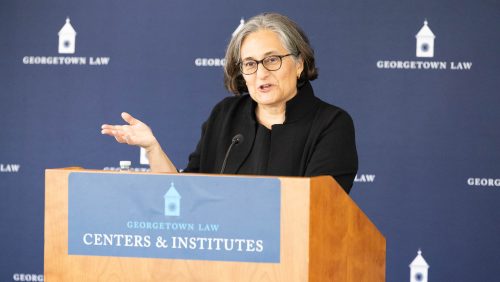Human Rights Lawyer Agnieszka Fryszman, L’96, Delivers 2025-2026 Drinan Lecture on Human Rights
November 20, 2025

Agnieszka Fryszman, L’96
Leading human rights lawyer Agnieszka Fryszman, L’96, joined students, alumni and members of the Georgetown Law community on Nov. 13 to deliver the Human Rights Institute’s annual Drinan Lecture on Human Rights.
Fryszman is the founder of the Human Rights practice at Cohen Milstein and 2025-2026 Robert F. Drinan, S.J., Chair in Human Rights. Since 2006, the Drinan chair has brought leading human rights advocates and experts to Georgetown Law in order to teach and engage with the campus community while contributing to human rights advocacy efforts in the United States and abroad.
Fryszman is not only a Georgetown Law alumna, but even had the chairship’s namesake, who was a Jesuit priest and former member of Congress, as a professor herself. She is the third Drinan chair to hold a Georgetown Law degree. “[Father Drinan] was a legend in the Congress, he was a legend in human rights law and he was a legend here at Georgetown,” Fryszman said of her former mentor. “But most importantly, he was a fighter, and that’s what we need now … because it’s easy to feel discouraged about everything that’s happening in the world today.”
In her address, “Against the Headwinds: Human Rights Lawyering in a Fractured World,” Fryszman discussed the role of lawyers in advocating for survivors of human rights violations amid rising authoritarianism and challenges to the rule of law. “All of you, you can do this,” she urged the students in the audience. “You can represent clients and change the trajectory of their lives.”
Fryszman reflected on her work on behalf of victims of trafficking, torture, forced and slave labor and other grave human rights abuses, including winning the first successful U.S. judgment for men enslaved aboard fishing vessels and securing a landmark settlement from ExxonMobil for Indonesian villagers who alleged that soldiers retained by the company had tortured and killed local residents.
Fryszman also discussed the novel legal strategies that she and other human rights lawyers use to hold corporations, foreign governments and other institutions to account for human rights violations, noting the challenges presented by the Supreme Court’s narrowing of federal courts’ jurisdiction over claims for violations of international law.
“You need to find a law that fits,” said Fryszman, who in the spring semester will teach a course on human rights litigation in U.S. courts. “It might be negligence law, it might be foreign law, [it] might be international law.”
Fryszman also noted the importance of avenues beyond legal advocacy, including electoral politics and public policy, in helping uphold human dignity and the rule of law.
“Even though it’s never been perfect or fair, that promise of the rule of law, of justice in our courts, is worth fighting for,” she said. “With a little bit of legal creativity, a little bit of luck and a lot of tenaciousness, I think it’s possible to hold onto and expand that promise.”
Watch the full lecture, followed by a question-and-answer session led by Human Rights Institute Executive Director Elisa Massimino, here: